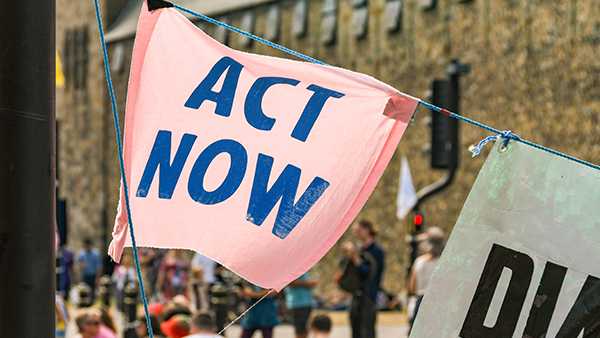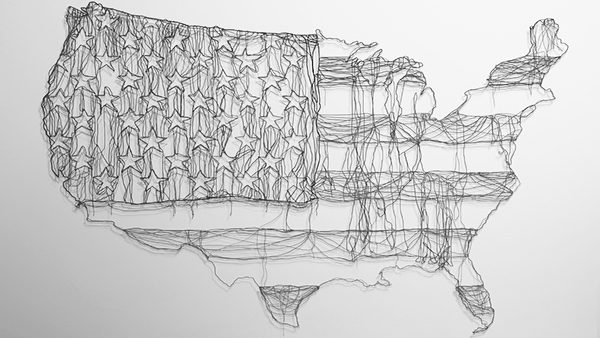So, we simply have no idea what will now happen. In the tube on the way to work I heard a Remain supporter say 'it’s like death in the family' to which her companion replied 'it’s like a death followed by the dawning realisation that the deceased has not left a will, was deeply in debt and has several illegitimate children'.
Somewhere on the scale from distinctively possible to quite probable lie the following:
- A relatively straightforward transition to the UK being outside the EU but having good trading and other links with Europe
- The break-up of the EU as we know it as other countries vote to leave
- A fundamental review of the European union including the dismantling of elements previously seen as sacrosanct, such as free movement
- A second referendum in the UK with a formerly Brexit Prime Minister presenting a new deal and arguing for ‘remain’
- The break-up of the UK as the SNP demands and win a second independence referendum
- An upsurge in nationalism in Northern Ireland as most republicans and even some former Unionists decide it would be better to be in an Irish federation in the EU than in the UK outside
- A long term period of deep economic slump as international concerns about the UK and its place in Europe intersect with major structural weaknesses such as our high levels of public and private debt
- An early general election forced on the Government by the public’s unwillingness to have a Prime Minister imposed on them by the 150,000 members of the Conservative Party
- The Labour Party fracturing and becoming irrelevant in large parts of England as it has done in Scotland.
- Substantial civic mobilisation and conflict take place as, in the context of crisis, the many geographical and cultural tribes of the UK confront each other
Given that one of the most important duties of political leaders in power is to provide order and security how have we got to a level of uncertainty and danger unprecedented in modern peace time?
This will be debated long and hard. There will be those who will argue that the underlying factor lies in the characteristics and contradictions of the modern financialised capitalist economy. This is why a line can be drawn linking yesterday’s vote to a revolt against the elites all over the world. Others, and, of course, these explanations overlap, will point to the inability of state regimes to deal with the multiple impacts of globalisation and particularly the movement of people.
In all this, I don’t think we should underestimate the role of institutional failure. The EU itself is a prime example – it is not just that it is unloved, for far too long its leaders seemed impervious to deteriorating public opinion. The failure of internal solidarity in relation to the debt crisis and external solidarity in relation to the refugee crisis has destroyed the moral legitimacy of the European project, while a failure to reform has eroded the pragmatic case.
But the frailties of our own institutions too have played their role. This referendum was only held because of the internal divisions of the Conservative Party. It was lost by ‘remain’ in large part because Labour has opted to be left wing campaign group rather than serious Party of Government. Will the country now accept the legitimacy of a Prime Minister elected by the highly unrepresentative demographic who make up the Tory membership?
I asked yesterday why politicians reject the proven value of deliberative democracy as a way of bridging public and expert opinion. But this is only one of many radical ideas that we need to consider if our political institutions are to become fit for purpose. There is reform taking place – in Parliament for example – but it isn’t fast enough or nearly as radical as it needs to be. Changes are needed not just to systems and processes but to styles of leadership and ethical norms.
The rest of us have a role too - and this includes the RSA. Not just calling for new ways of thinking and governing but exemplifying different models of engagement and social change. Next week, for example, we will be launching our Citizens Economic Council a major, deliberative response to the terrible level of public economic understanding and discourse (something evident again in the referendum campaign itself).
Even though I voted the other way, I genuinely hope there is way to give the British public what it has chosen without courting disaster. But whatever befalls us, we urgently need to grasp how much our core institutions and their leaders have to change to meet the challenges of today and tomorrow.
Related articles
-
The public are ready to go further and faster on net zero
Anthony Painter
The public are ahead of policy-makers and, indeed, most of the business world. COP26 is an enormous opportunity to catch up. Global leaders should take it.
-
Can progressives ever stop the in-fighting?
Matthew Taylor
Biden's victory has caused the left and moderates to fracture again.
-
Can President Biden bring America together again?
Anthony Painter
There is a long road ahead for the new president.




Join the discussion
Comments
Please login to post a comment or reply
Don't have an account? Click here to register.
Excellent post Matthew. I think I, like others have been pondering how to make sense of, thenoperate within a new environment which (whilst we may or may not have wanted it)probably represents one of the greatest challenges of our generation.
Like a few others, I’ve concluded that worthier people thanI can debate the history and the tremendous affronts to democracy, empiricism,decorum and demographics that all the campaigns have achieved. I’m far more motivated by the requirement tomake Brexit (the term is jingoistic, but has stuck, so we had betterappropriate it) actually work. Otherwiseabysmal failure and isolation will be the result.
My starting point is that there are a set of persuasive andtotemic people who argued for Brexit and who got it through a popularvote. However, I don’t also see them ascompleter-finishers, the sort of people who can conceptualise then negotiate agraceful separation. So these people arecloser to being part of the problem, not the solution, and even if we seeleadership changes in our main political parties the problem remains; a lack ofleaders for whom delivery (not rhetoric) is a skill.
Add to this the fact that Brexit has no present start or endpoint, and the leadership vacuum is suddenly very worrisome, terrifying infact.
If this torpor continues then our businesses and our socialinfrastructure will decay rapidly because of loss of confidence, stifledinnovation, and fear of the unknown. Wecan’t theorise our way out of this, we have to heave ourselves out of this.
It strikes me that the RSA has a brief window of opportunityto be somewhat different from the herd who want to analyse the situation we’rein, and instead come up with some smart ideas to make our industry (arts,manufactures and commerce) and society value our existence. Since the 24th I and many othershave been extensively occupied by this, and the lesson is repeatedly that we’reasking some very fundamental questions in business now, and needing help withpractical answers. However, the RSA isan excellent potential resource for the answers?
Several posts on this site (including your own) suggest thatpart of the answer to this is the CEC and I don’t doubt it. However, I wonder if the RSA could make amore explicit attempt to take a leadership position on an element of Brexit,transcending the politics, eschewing the mawkish and the theoretical, but producingpractical support and solutions to people whose enterprises are affected inways that they might not yet have anticipated?
...and I have no idea what has happened to the punctuation!
Labour's last chance is for somebody to step forward as a leadership candidate on the basis that if an early election is called (prior to Article 50) they will stand on the basis that if elected they would firstly seek to renegotiate with the EU and then secondly call a second referendum with a final opportunity for the public to decide in or out.
This would be legitimate on the basis the leave campaign has admitted its campaign was based on untruths.
It's not likely to happen because it would require somebody to stand on the basis of a belief rather than personal ambition.
More likely is that the party will split. Sooner or later the Tories will too.
OMG. What chaos! RSA certainly has an important post Brexit role to play.
We should ask and attempt to answer the most basic questions, starting with the one that Google apparently reported as being the most asked....WHAT IS THE EU?
I would suggest this should lead to three main statements about the Past, the Present and the Future.
1. The EU was formed as a concept to bring together the warring tribes of Europe in the 20th Century
2. The EU has been successful in creating a mechanism that encourages deliberative democracy between existing states (France, Germany, Spain and so on) but EU has failed in several major respects:
2.1 It has created a bureaucracy that is not accountable for performance.
2.2 It has been unable to anticipate and respond effectively to several big issues including the influx of refugees from outside its borders.
2.3 It has demonstrated a lack of strong leadership...the rotating system does not work.
2.4 It has seriously underestimated the importance of mass communications through multiple media channels.
2.5 It has formulated no vision with the power to grab the attention of the majority.....the young, the older and the middle class who pay the bills.
3. The EU needs to move fast through a tiered digital network to create a relevant vision for the 21st Century that reinvigorates its role from local to regional and national levels.
Matthew, I'm sure you know more about EU law than I do, but listening to this talk by Professor Michael Dougan at Liverpool University leads me to believe that your first bullet point is far from 'distinctly possible'. I watched this clip with mounting fear for what has just come to pass: http://tinyurl.com/j9tf2g9
You refer to a 'terrible level of public economic understanding and discourse' – why do you think it is that there was not more of such informed and practical information regarding the reality of a Brexit Leave vote made available by any political party, or even any professional bodies such as the RSA, in the lead up to the referendum?